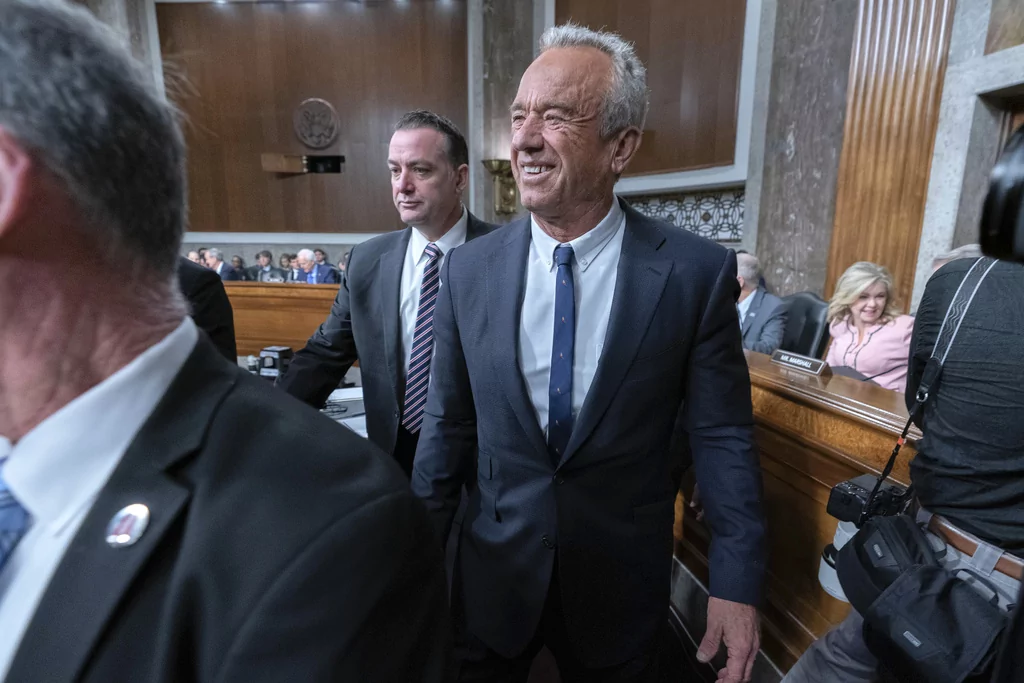Robert F. Kennedy Jr. cleared a crucial Senate hurdle on Tuesday after the chamber’s Finance Committee advanced along party lines his nomination to be health and human services secretary.
Sen. Bill Cassidy (R-LA), a former physician who clashed with the Trump nominee during confirmation hearings last week over Kennedy’s vaccine skepticism, was an initial holdout but ultimately voted in favor of Kennedy in a 14-13 vote.
Kennedy’s nomination will now be considered by the full chamber, and his chances of being confirmed appear high. Other Republicans who may oppose Kennedy and have expressed concerns about his vaccine skepticism include Sens. Susan Collins (R-ME) and Lisa Murkowski (R-AK). Kennedy can afford no more than three GOP defectors, as it appears unlikely that any Democrats will support him.
Kennedy has emerged as one of Trump’s most controversial Cabinet picks. He has faced headwinds over his qualifications, advocacy against vaccines, and promotion of public health conspiracies.
Cassidy came to his decision after additional conversations over the weekend with Kennedy and Vice President JD Vance. He has faced immense political pressure from fellow Republicans as he prepares for a 2026 reelection against a conservative primary challenger. Opposing Kennedy would have further jeopardized his fight to continue his Senate career.
“I’ve had very intense conversations with Bobby and the White House over the weekend and even this morning. I want to thank VP JD specifically for his honest counsel,” Cassidy said on social media. “With the serious commitments I’ve received from the administration and the opportunity to make progress on the issues we agree on like healthy foods and a pro-American agenda, I will vote yes.”

Cassidy declined to answer questions from reporters as he left the committee vote. Last week, during one of Kennedy’s hearings, Cassidy said the nominee had a large hurdle to overcome to ensure that he was open to evidence that vaccines are safe and effective.
In additional remarks made later on the Senate floor, Cassidy laid out key assurances made by the White House and Kennedy to secure his support. Cassidy, who chairs the Senate Committee on Health, Education, Labor, and Pensions, warned he would use his authority “to rebuff any attempt to remove the public’s access to life-saving vaccines without ironclad causational scientific evidence that can be accepted and defended before the mainstream scientific community, and before Congress.”
Cassidy said he would have “input into hiring decisions at HHS, beyond Senate-confirmed positions.”
Kennedy pledged not to make changes to recommendations from the Centers for Disease Control and Prevention’s Advisory Committee on Immunization Practices, a group of experts that provides advice on vaccines, Cassidy said. Also, CDC will not remove language on its site to the effect that vaccines do not cause autism.
Major campaign contributors to Cassidy include PACs tied to the pharmaceuticals and broader healthcare industry, laying the groundwork for clashes with “Make America Healthy Again” advocates as HHS fills key positions.
“Mr. Kennedy and the administration committed that he and I would have an unprecedentedly close collaborative working relationship,” Cassidy said. “If he is confirmed, we will meet or speak multiple times a month. This collaboration will allow us to work well together and therefore to be more effective.”
Kennedy, the legacy Democrat, environmental lawyer, and nephew of President John F. Kennedy, gained national prominence in the public health arena as vaccine hesitancy increased due to COVID-19 vaccine mandates.
CLICK HERE TO READ MORE FROM THE WASHINGTON EXAMINER
Following his failed independent presidential campaign in 2024, Kennedy joined the Trump campaign under the banner of “Make America Healthy Again,” with the ostensible goal of rooting out pharmaceutical and big agriculture industry interests from public health agencies.
But Kennedy has made significant profits from lawsuits against vaccine manufacturers, which Sen. Elizabeth Warren (D-MA) highlighted during his confirmation hearings as a financial conflict of interest. Kennedy later revised an ethics agreement to divest his financial stake in any pending litigation against the HPV vaccine Gardasil.
